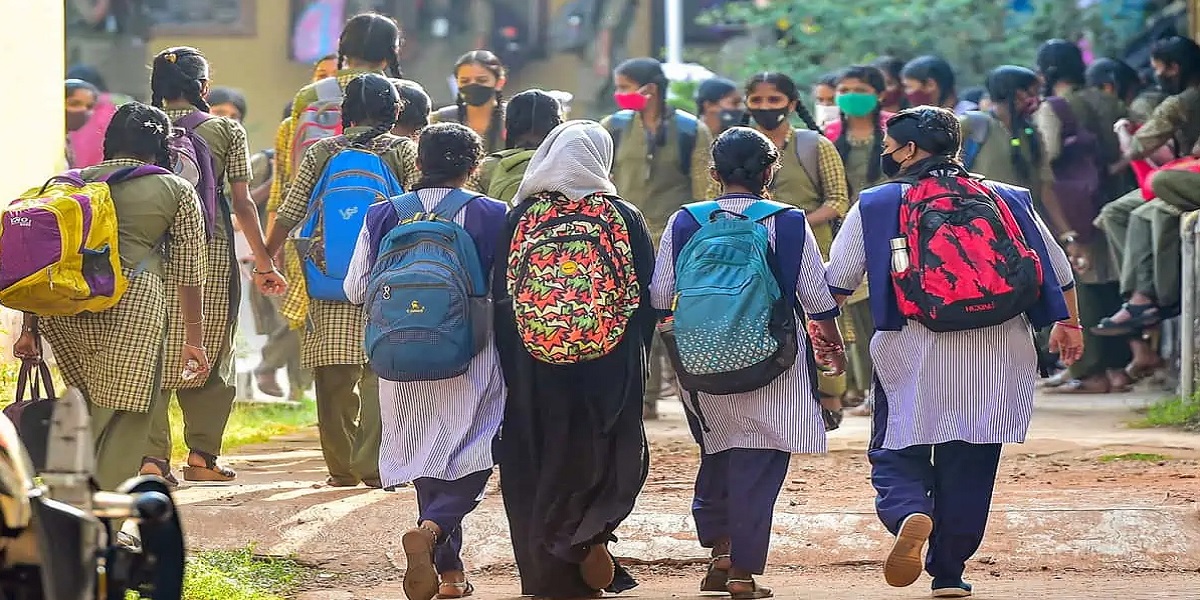Published Jun 21, 2025 | 9:00 AM ⚊ Updated Jun 21, 2025 | 9:00 AM

Foot-washing ceremonies in Kerala schools spark outrage, government orders probe
Synopsis: While many welcomed the extended school hours, the Samastha Kerala Jamiyyathul Ulama opposed it, saying the 15 additional minutes in the morning would affect those students attending the madrasa. General Education Minister V Sivankutty has expressed willingness to hold talks to find a solution.
The Kerala government’s recent decision to extend school hours by 30 minutes daily for students of Classes VIII to X has triggered a heated debate involving educational priorities and religious practices.
According to the revised schedule, high school classes will now run from 9.45 am to 4.15 pm, excluding Fridays, with 15 additional minutes in both the morning and afternoon sessions.
This move, effective immediately across all state-syllabus schools, is aimed at aligning with the Right to Education (RTE) Act mandate of 1,100 instructional hours and 220 working days annually. To meet these requirements, six specific Saturdays, 26 July, 16 August, 4 October, 25 October, 3 January, and 31 January, have also been designated as working days for Classes VIII to X.
The change follows a Kerala High Court directive for a review of the academic calendar, after which a five-member expert panel recommended extending school hours to ensure sufficient teaching time.
While the move has been positioned as a student-centric reform, it has sparked criticism from Samastha Kerala Jamiyyathul Ulama, a prominent Sunni Muslim scholarly body in the state.
Sayyid Muhammad Jifri Muthukkoya Thangal, a senior Samastha leader, raised concerns during the launch of a coffee table book on the organisation’s history, highlighting that the extended hours could clash with religious (madrasa) classes attended by many students.
Responding to the concerns, Kerala General Education Minister V Sivankutty expressed the government’s willingness to engage in dialogue. He reiterated that the revised timings are in the students’ best interest and insisted that there was no administrative misstep behind the decision.
However, the ground reality in many Kerala schools is more nuanced. A rigid approach could also widen the gap between public schooling and parallel religious or alternative education systems.
From now onwards, all schools in Kerala will have 220 working days, a move that finally enforces a long-neglected provision of the Kerala Education Act, 1959. The decision, implemented despite resistance from some teacher associations, stems from a 2.5-year legal battle led by C.K. Shaji, manager of Ebenezer Higher Secondary School (Aided), Muvattupuzha.

C.K. Shaji
Facing online criticism and opposition from teacher union activists, Shaji, along with the School PTA, approached the high court seeking enforcement of norms laid out in both the Kerala Education Rules (KER) and the Right to Education (RTE) Act, 2009. These laws mandate:
Classes 1–5: Minimum 200 working days, 800 instructional hours
Classes 6–8: Minimum 220 working days, 1000 instructional hours
Minimum teacher working hours per week: 45 hours (including prep time)
Acting on the court’s interim directive, the Education Department released an academic calendar last year, including Saturdays as working days to meet the 220-day requirement. However, after some teacher unions challenged this, a single-judge bench struck down the inclusion of Saturdays.
Shaji and the PTA appealed to a Division Bench, which gave the department more time to issue a revised calendar. When the department failed to act, a contempt of court petition was filed. The final court ruling now makes the 220 working days mandatory across Kerala schools.
When South First contacted Shaji, he pointed out a glaring disparity in Kerala’s school system.
CBSE schools in the state start at 7.30 am and wind up by 3 pm. Nobody complains,” he said, noting that most privileged children attend CBSE or ICSE schools, while public schools are the only option for the poor and underprivileged students.
”Last year, our school had only 156 academic days, excluding floods and other emergencies, while unaided schools operated for nearly 250 days. Why should poor children be denied the same number of learning days? They don’t have backup options like others. Neglecting academic time in public schools will only deepen the dropout crisis among the underprivileged.”
He urged policymakers not to ignore this widening gap, warning that it would lead to long-term damage in educational equity.
South First found that the average number of academic days ranged between 156 and 204, well below the Right to Education (RTE) Act mandate of 220 working days and 1,100 instructional hours.
Surprisingly, Kerala, often praised for its educational achievements, ranks among the lowest states in academic days. According to the Unified District Information System for Education Plus (an educational management information system under the Department of School Education & Literacy, Ministry of Education under the Government of India), the academic days are as follows:
J&K/Arunachal Pradesh: 204
Meghalaya: 192
Kerala: 196 days
Nagaland: 199
Mizoram: 200
In contrast, other major states perform significantly better according to the data.
Gujarat: 251 days
Punjab: 250 days
Karnataka: 244 days
Andhra Pradesh / Telangana: 229 days
Delhi: 220 days
Tamil Nadu: 210 days
This shortage of instructional time is pushing underprivileged students toward private tuition, increasing pressure and inequality. Beena K, a private tuition teacher from Aluva, noted that many students have become reliant on online tutorials.
”We recently let go of our online tutors, but students continue to need additional support. Learning isn’t something that fits into a capsule—it requires time and consistent effort.”
Beena, who works for under ₹20,000 a month, pointed out the disparity, ”Private school teachers like me work hard for modest salaries. Meanwhile, government and aided schoolteachers earn close to ₹1 lakh, but still resist extending academic days, claiming to cover portions through special classes.”
She questioned the real outcomes. ”How many fifth graders can read Malayalam fluently now?” The situation, she says, is affecting not just learning quality but the overall future of Kerala’s children.
Jigy R, a teacher at Amrita High School in Kottayam, welcomed the government’s move to extend school days.
”This is a step in the right direction. More classroom time will improve quality. Without it, our students risk falling behind in professional and competitive fields dominated by CBSE and ICSE students. We had only 190 academic days last year.” he told South First.
However, he flagged practical concerns, rescheduling school bus services, outdoor tuition timings, and the lack of consultation with teacher associations.
”As per department guidelines, we are supposed to complete the 10th-grade syllabus by 10 December and dedicate the rest of the time to revision. Teachers already put in a lot of unaccounted effort.”
Students, too, are reacting positively. Bhavya Krishna of Class X believes more classes will help achieve better results. Devnarayanan, a Class IX student, offered another view.
”This is the only time we get to interact closely with teachers. We should use it not just for marks but to build good relationships with them.” He emphasised that more time in school positively shapes personality and social skills, better than sitting in front of online tuitions or mobile games.” (Both from Amrita High School)
Dr. PK Fazal Gafoor, president of the Muslim Educational Society (MES) and a respected educationist in Kerala, shared a nuanced perspective on the extension of school hours.
In 2019, MES sparked controversy by issuing a circular that banned face veils in several of its affiliated colleges.
We welcome the government’s move to extend school hours, but it must be sensitive to Kerala’s cultural and religious context. For many Muslim students, especially from the Sunni community, morning madrasa sessions are not just routine; they’re a key part of moderate, Sufi-influenced religious education. This community lacks global networks or significant funding.
Disrupting their peaceful learning spaces could create a vacuum that extremist groups may exploit, pushing students towards more rigid and potentially radical ideologies, a serious risk to Kerala’s secular fabric.
We’re not opposing reform, but suggest shifting extra school hours to the evening to avoid clashing with madrasa time. It’s not about special treatment- it’s about social stability.
Also, our education system needs honest introspection. The all-A+ trend hides deeper flaws. Last year, 17,000 students got full A+, yet many failed competitive exams like NEET, leading to disappointment and depression.
Policy must go beyond numbers. We’re shaping minds, emotions, and the cultural future of our youth, and our nation.” he told South First.
(Edited by Majnu Babu).

